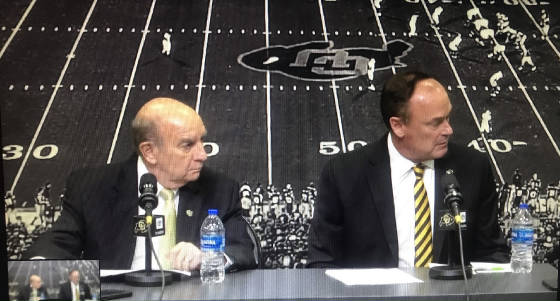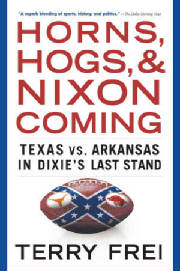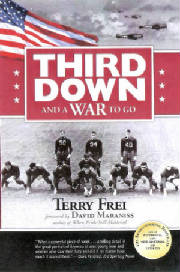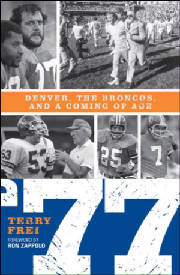July 27, 2023

CU Chancellor Phil DiStefano and Athletic Director Rick
George at Thursday news conference
I was raised in the shadow of the University of Oregon campus in Eugene, where my father was on the Ducks' football
staff for 17 years.
I graduated from the University of Colorado in Boulder.
With those connections, it's probably not surprising that I was
bullish about CU's move to join the Ducks in the Pac-12 in 2011. I long maintained that CU was a much better cultural and
academic fit for the Pac-12 than it was for the Big 12.
I'm not completely backing down, not even after Thursday's announcement in Boulder
that CU would return to the Big 12 for the 2024-25 academic and athletic year.
You might
wince at this, but CU going to the Pac-12 was the right move at the time and since in an evolving college athletics landscape
that included fears at one point that the Big Eight might disintegrate or be considerably weakened.
Just because a) the CU athletics
and campus administrations, and, b) the Pac-12 leadership (primarily inept and now-former league Commissioner Larry Scott),
botched the transitions doesn't mean the switch was a doomed stratagem from the outset.
In fact, it should have worked.
CU didn't aggressively enough acknowledge the degree of commitment
necessary to have a consistently successful football program until this one was inches away from sliding off the cliff last
year. The course correction included Deion Sanders' hiring and the sudden flexibility in getting transfers quickly into school.
Most programs took that for granted as the portal became increasingly important. Even Karl Dorrell detractors should admit
the CU administration changed its philosophy 180 degrees during and after Sanders' hiring, going from idealistic to pragmatic.
Also, to be fair, the changes that have led to programs playing games of musical chairs in expansion
and realignment have been more dizzying in recent years. But what seems to be underplayed is that CU will be returning to
a very different league than it left. Sure, for the sake of sepia-toned nostalgia, we could turn this into a Buffs return
to the league that finished 1 (Nebraska), 2 (Oklahoma), and 3, (Colorado) nationally in the 1971 football season -- except
one is gone to the Big Ten and one is on the verge of leaving for the Southeastern Conference (along with Texas).
I do think CU ended up cutting
the cord somewhat reluctantly, until the very end actually believing the pro-Pac-12 rhetoric about higher-tier universities
and academic commitment. Chancellor Phil DiStefano and Athletic Director Rick George
saw fit Thursday at the late afternoon news conference to aggressively and favorably compare the academic stature of the evolving
Big 12 membership (also adding BYU, Central Florida, Cincinnati and Houston) to the Pac-12's. It seemed forced, and in the
win-baby culture, "fit" almost has become irrelevant.
It also was interesting that George seemed so conscious of the criticisms about travel
in the Big 12, shooting down the contention that it would be far "worse" than in the Pac-12. At least it's going
to be no USC-Rutgers in Big Ten volleyball.
Bottom line: After USC and UCLA committed to move to the Big Ten, CU's departure wasn't automatic.
But new Pac-12 Commissioner George Kliavkoff's delay in closing a new media rights deal and getting it on the table was maddening,
and even as the league's other key players (e.g., Oregon and Washington) remained under the tent, Colorado's decision to bolt
is both understandable and -- again -- the right move.
I hope it works this time.
Both George and DiStefano brought up
the Big 12's media rights extension that runs through 2031 with Fox and ESPN, but George said it wasn't just about the money.
Of course it is.
It always is.
Here's the joint statement
from DiStefano and George:
Today, we have announced that the University of Colorado Boulder will join the Big 12
Conference in time for the 2024-25 season.
Decisions
of this magnitude take an enormous amount of consideration over a number of different factors but ultimately, we decided the
stability, resources, and exposure would position CU Boulder, our programs, and our student-athletes for long-term future
success.
The
Big 12 Conference recently signed a media rights agreement extension that will make them partners with the country’s
two largest sports media companies, ESPN and FOX, through the 2030-31 season. This national exposure, through linear television
and streaming, combined with the Big 12 Conference’s footprint across three time zones, will not only make CU more accessible
to alumni and fans nationwide, but introduce the Buffs to countless new potential students and fans.
The Pac-12 is a great conference of which we were honored to be a member the last 12 years,
but we feel the Big 12 will help CU Boulder continue to cement itself as one of the country’s foremost institutions,
both in competition and in the classroom.
Some will see this as a return to our roots, but this was a decision made solely based
on the future and we hope you’ll join us for this exciting new era for CU Boulder.
In the meantime, thank you for your continued support of Colorado Athletics as we get ready
for a successful final season in the Pac-12. Go Buffs!









